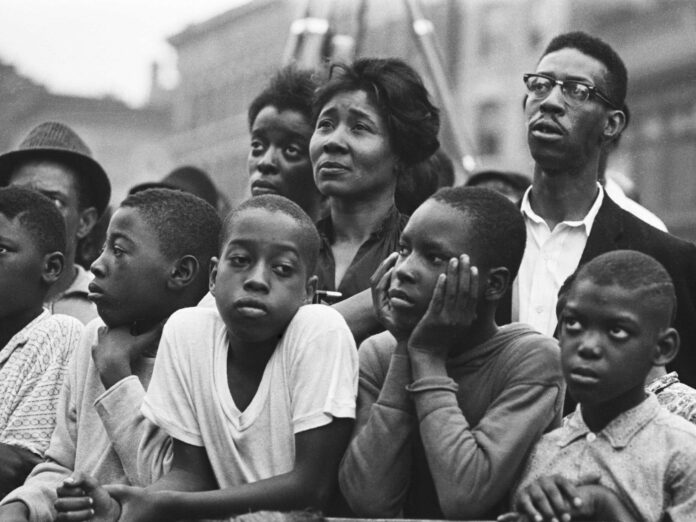By Jeph Ajobaju, Chief Copy Editor
Black Americans are voting in great numbers, and ensuring their votes count, as they are pushed to refight social justice battles they had won for centuries, including gains of the recent Barack Obama years, which Donald Trump has eviscerated.
African Americans are voting at a rate more than double that of 2016 at this stage.
They account for 13.4 per cent of the population of the United States, or 44 million of the total 331 million. Yet their voice and vote matter. And they know it.
The campaign of Joe Biden, the Democrat vying to replace Trump, was dead in water in the primaries early this year after he lost in three straight contests – in Iowa, New Hampshire, and Nevada.
All of that was until South Carolina.
Blacks’ motivation to vote
Even before Obama, the first Black president elected on the platform of the Democratic Party, African Americans knew from history that their lot is better with Democrats than Republicans.
And they knew that, among all the Democratic primary contenders, Biden had the best chance of beating Trump if given the ticket.
Despite the gloom in the Biden campaign at the time, and attacks from other flanks of the of Democratic Party, African Americans in South Carolina said: “We know Joe Biden. We will vote for him.”
Black folks rallied their ranks, 30 per cent of the South Carolina population, to campaign for Biden across the state, and down ballot, and they powered him to victory over Bernie Sanders by 29 points (48.4 per cent to 19.9 per cent).
Biden has won everything else since that Lazarus-like resurrection in South Carolina in March. To compensate Blacks, he picked Kamala Harris as running mate.
Opinion polls say the Biden-Harris ticket is now within sights of the White House.
Some 87 per cent of Black Americans disapprove of Trump, and 92 per cent registered voters among them support Biden over him.
This year alone, more than nine million Americans have been infected with coronavirus, which has killed 232,101 and counting. Blacks are the most affected of all demographics.
Long before coronavirus, African Americans were already held down by institutional racism manifesting in poverty, poor health care, bad housing, high crime rate, high unemployment, high imprisonment rate, and other negatives.
Coronavirus simply mixes up with these pre-existing conditions to make things worse for Black communities.
Biden pledges that, if elected, he will be the president of all Americans, those who voted for him and those who did not.
He promises a “caregiving economy” that is fair to all.
He plans to reform the criminal justice system, address poverty and educational disadvantage in a package that includes $70 billion for historically Black colleges and universities.
Biden also promises to create more fairness in the tax and economic systems to help Black families build more wealth.
These issues resonate with African Americans and, in response, the bloc is voting with enthusiasm; as CNN reports below:
Saving the U.S. from division
Dave Richards arrived at his polling place before dawn, carrying a blue lawn chair and a giant bottle of water.
It was about 6 a.m. on October 12 – the first day of early voting in Georgia – and the business consultant was ready for a long wait in the Atlanta suburb of Smyrna. After three hours in line, Richards, 51, voted in what he called the most crucial election of his lifetime.
“This election is more important than the 2008 one for Barack Obama. That 2008 one was for change and making history. This election is for saving the U.S.,” Richards said, citing concerns about racial justice and suppression of Black voters.
“The racial divide that is going on, we need someone who is going to be a leader for everyone, not just their base.”
Across the country, Black voters are turning out in huge numbers. The stakes this year are especially high, they say, and nothing less than their health and safety is on the ballot.
In interviews with CNN, they said they’re worried about racial injustice and police brutality, they feel devalued by a President who has hesitated to condemn White supremacy and they fear losing health benefits if the Supreme Court overturns the Affordable Care Act.
Many said this feels like the most important election of their lifetimes.
During a raging pandemic that has killed more than 230,000 Americans and ravaged Black communities, many Black voters could have mailed in their ballots.
But after recent headlines about postal workers dumping undelivered mail and PTrump’s debunked claims questioning the integrity of mail-in ballots, many don’t trust that process.
“The pandemic did not scare me,” Richards said. “The way that 45 (Trump) was talking about mail-in voting and lying about it, I wanted to do it (vote) in person.”
No trust in Trump
So far this fall, African American voters are rushing to the polls at much higher rates than they did four years ago, when Hillary Clinton was on the ballot.
By October 28, more than 601,000 Black Americans had voted early in Georgia compared with about 286,240 two weeks before the 2016 election.
In Maryland, about 192,775 had voted compared with 18,430. And California had over 303,145 – up from more than 106,360 two weeks before the election four years ago.
That’s according to Catalist, a data company that provides analytics to Democrats, academics and progressive advocacy organisations.
Keith Green, 65, went to the polls last week in Overland Park, Kansas, to vote in person – for several reasons.
“We have a racist President who lies too much,” he said. “He keeps on saying he doesn’t trust the Democrats. Well after everything that has gone on with the ballots, I don’t trust the Republicans.”
Trump has repeatedly said he’s done more for African Americans than any president since Abraham Lincoln. As evidence, he has cited low unemployment among African Americans, criminal justice reforms and increased federal funding for historically Black colleges and universities.
Some prominent Black Republicans, including Sen. Tim Scott of South Carolina and Kentucky Attorney General Daniel Jay Cameron, have sung his praises.
But most Black people aren’t convinced. Gallup polling over the summer found that 87 per cent of Black Americans disapproved of his job as President.
Green said the Trump administration has left him worried about the future for his daughter and his two grandchildren. He believes Trump has emboldened White supremacists and set the nation backwards on the path for civil rights and equality.
“The last four years have been so bad,” he said. “We can’t stand four more years of that.”
Health care, the courts
Wilburn Wilkins, 61, woke up early on October 7, put on two masks and headed to a voting center in Joliet, Illinois, with his wife. Although the retiree has pre-existing conditions, he wanted to vote in person.
“We have a President who is totally tearing apart our whole democratic Constitution,” Wilkins told CNN. “Many people are dying because he is ignoring the Covid pandemic, ignoring the fact that people are unemployed, need financial resources. We need a change.”
Like Green, he believes the White House’s decisions have undermined Black people and other minorities.
“The nomination of a conservative to the Supreme Court, stacking of lower courts in order to have cronies to carry out conservative ideas, most likely will affect Black and Brown people,” Wilkins said.
“They’ll affect things such as civil rights, Obamacare – all of these things have the potential to negatively impact minorities.”
There’s a lot at stake in this election, said playwright and composer Nolan Williams Jr., 51, who lives in Washington, DC, and plans to vote in person on Election Day.
Williams has composed an anthem, “I Have a Right to Vote,” to raise awareness of voter suppression and motivate Black people to cast their ballots.
It features original “Hamilton” cast member Christopher Jackson, entertainer Billy Porter and others reciting the words of abolitionist Frederick Douglass, the late Rep. John Lewis and the late Justice Ruth Bader Ginsburg.
“For African Americans in this country, voting is the most effective way for us to effect the change we seek. Given the events of this summer, it is crucial for our community to translate our social protests into political action,” Williams said, referring to the deaths of George Floyd and Breonna Taylor and the unrest that followed.
“Health care, fair housing, including equal access to home loans, poverty, the environment, meaningful reforms to our justice system, and improvements in community policing are all issues that make this election uber critical,” he said.
Opportunity to vote for change at every level
In Georgia, many Black voters say they have been motivated to vote in person by what happened in 2018, when Republican Brian Kemp ran against Democrat Stacey Abrams for governor while serving as the state’s chief elections officer.
Kemp, who as Georgia’s secretary of state had promoted and enforced some of the nation’s most restrictive voting laws, was accused repeatedly before and during the campaign of seeking to suppress the minority vote.
Kemp won narrowly, and Abrams argued that he had used his position to suppress Black votes.
Kee-Kee Osborne, 42, of Mableton, Georgia, said that’s one of the reasons she voted in person this month – to make sure her voice counts.
“For me, the outcome of this election will be the difference between truth and deception, decency and dishonor, inclusion and intolerance,” said Osborne, who works as an information technology manager.
“The words, actions, and policies from the current (Trump) administration have deepened the marginalisation of Black people over the last four years. It is imperative for our community to be engaged in the process because we have an opportunity to vote for change on every level.”
In Los Angeles, business manager and travel blogger Nancy Gakere, 47, woke up early one day this month to drop off her ballot. She also signed up for a tracking service to ensure her vote is counted.
“I wanted to make sure I personally deliver my vote,” she said.
“This election is so important to Black people because of current events like the killing of George Floyd and Breonna Taylor (and) the way the coronavirus pandemic has disproportionately affected Black people.”
“This has exposed the long-standing institutional racism and racial inequalities that exist in America.”
But for Gakere, the most important issue is preserving health care under the Affordable Care Act.
“We have family members with pre-existing conditions, and we feel that it’s at risk of being overturned,” she said.
With Election Day on the horizon, Wilkins has a message for Black voters.
“Many people have died for us to have that right to vote. We cannot take it for granted. This is a privilege that was not offered to our ancestors,” the Illinois man said.
“They’re trying to stop us from voting right now by gerrymandering, intimidation, voter suppression in plain sight – all things that have been done in the past to our ancestors. That tells you how important it is for us to vote.”













